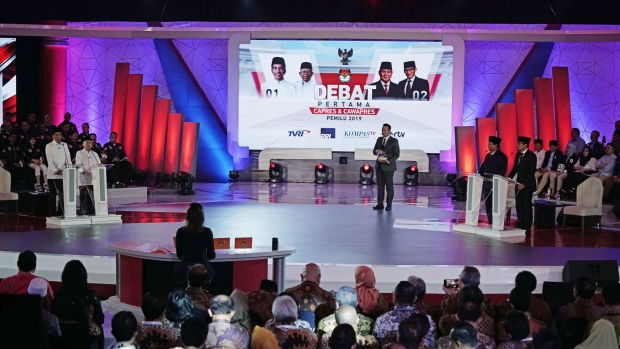Feb 16, 2019
Resource Nationalism Set to Dominate Indonesian Election Debate
, Bloomberg News

(Bloomberg) -- Indonesian President Joko Widodo and challenger Prabowo Subianto will face off in a second election debate on Sunday that will see the two candidates drill down into their policies on energy, food and infrastructure.
Stung by criticisms that the first presidential debate was too staged, the two men will speak without notes and face more questions from moderators, according to Wahyu Kurniawan, a commissioner at the General Elections Commission.
Widodo, known as Jokowi, is seeking a new mandate to carry on the infrastructure building boom and economic nationalism that’s marked his first term, during which the government wrested control of assets from companies such as Freeport-McMoRan Inc. and Chevron Corp. He’s also resorted to large imports of staples such as rice and sugar, which Prabowo, as Subianto is popularly known, referred to as anti-farmer policies.
Prabowo has already promised to slash company and individual tax rates to rejuvenate Southeast Asia’s largest economy. He is also pledging to deliver on programs for the poor, including reversing one of Jokowi’s most unpopular policies to abolish the fuel subsidy on RON88 gasoline, as well as raising wages of civil servants and police officers.
Investors are listening out for strategies on energy, food, infrastructure and environment from the candidates in a country where policy flip-flops and government intervention have often been cited as reasons for falling foreign direct investment. The market will also be looking for specifics on how they plan to implement their policies in these key sectors, according to David Sumual, chief economist at PT Bank Central Asia.
“What the market wants is a blueprint or a systematic plan for infrastructure, energy, food. At present, it’s not really clear,” Sumual said, referring to changes in fuel price, gas and cement policies. “There have been several interventions. This actually discourages investors, who want to invest in Indonesia.”
Heated Campaign
The debate will be held against a backdrop of an increasingly heated election campaign, which has seen Jokowi step up attacks on Prabowo with allegations that he employed foreign consultants as well as Russian influence peddling. Prabowo has responded by blaming Jokowi’s mismanagement of the economy for the nation’s rising food imports, foreign debt and a widening trade gap.
Jokowi, who ordered a freeze in fuel and electricity prices until the end of 2019, is battling a ballooning energy subsidy bill. Coupled with a widening current account deficit, they have weighed on the currency and contributed to record public debt.
Prabowo has pledged to revamp the fuel subsidy program to ease the burden on state-run oil company PT Pertamina, and said he would cut imports of agricultural products to shield Indonesian farmers.
Jokowi is still leading in opinion polls by around 20 percentage points over Prabowo, according to surveys in late January. Some of the recent polls indicate Prabowo may be narrowing the gap, with an Indikator Politik Indonesia survey showing his electability rising to 34.8 percent in January from 30 percent a month earlier.
To contact the reporter on this story: Arys Aditya in Jakarta at aaditya5@bloomberg.net
To contact the editors responsible for this story: Ruth Pollard at rpollard2@bloomberg.net, Thomas Kutty Abraham
©2019 Bloomberg L.P.


